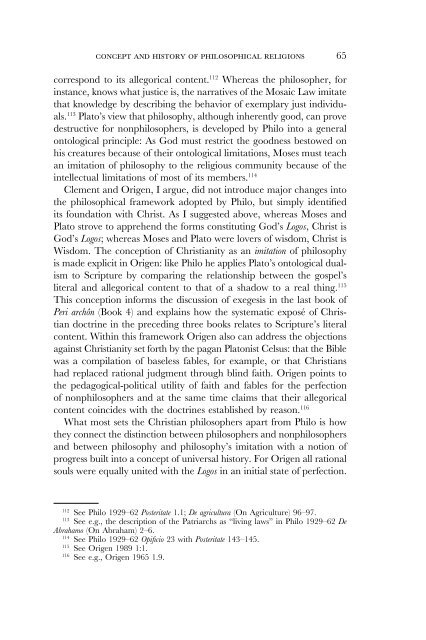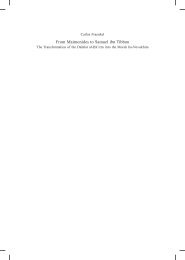Download PDF - Carlos F. Fraenkel
Download PDF - Carlos F. Fraenkel
Download PDF - Carlos F. Fraenkel
Create successful ePaper yourself
Turn your PDF publications into a flip-book with our unique Google optimized e-Paper software.
concept and history of philosophical religions 65correspond to its allegorical content. 112 Whereas the philosopher, forinstance, knows what justice is, the narratives of the Mosaic Law imitatethat knowledge by describing the behavior of exemplary just individuals.113 Plato’s view that philosophy, although inherently good, can provedestructive for nonphilosophers, is developed by Philo into a generalontological principle: As God must restrict the goodness bestowed onhis creatures because of their ontological limitations, Moses must teachan imitation of philosophy to the religious community because of theintellectual limitations of most of its members. 114Clement and Origen, I argue, did not introduce major changes intothe philosophical framework adopted by Philo, but simply identifiedits foundation with Christ. As I suggested above, whereas Moses andPlato strove to apprehend the forms constituting God’s Logos, Christ isGod’s Logos; whereas Moses and Plato were lovers of wisdom, Christ isWisdom. The conception of Christianity as an imitation of philosophyis made explicit in Origen: like Philo he applies Plato’s ontological dualismto Scripture by comparing the relationship between the gospel’sliteral and allegorical content to that of a shadow to a real thing. 115This conception informs the discussion of exegesis in the last book ofPeri archôn (Book 4) and explains how the systematic exposé of Christiandoctrine in the preceding three books relates to Scripture’s literalcontent. Within this framework Origen also can address the objectionsagainst Christianity set forth by the pagan Platonist Celsus: that the Biblewas a compilation of baseless fables, for example, or that Christianshad replaced rational judgment through blind faith. Origen points tothe pedagogical-political utility of faith and fables for the perfectionof nonphilosophers and at the same time claims that their allegoricalcontent coincides with the doctrines established by reason. 116What most sets the Christian philosophers apart from Philo is howthey connect the distinction between philosophers and nonphilosophersand between philosophy and philosophy’s imitation with a notion ofprogress built into a concept of universal history. For Origen all rationalsouls were equally united with the Logos in an initial state of perfection.112See Philo 1929–62 Posteritate 1.1; De agricultura (On Agriculture) 96–97.113See e.g., the description of the Patriarchs as “living laws” in Philo 1929–62 DeAbrahamo (On Abraham) 2–6.114See Philo 1929–62 Opifi cio 23 with Posteritate 143–145.115See Origen 1989 1:1.116See e.g., Origen 1965 1.9.



